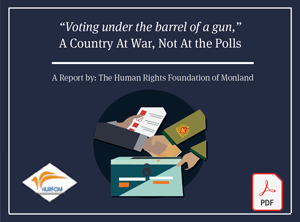2-year prison sentence for social media post signals renewed attack on freedom of expression in Mon State
July 5, 2019
On July 1st 2019, U Aung San Oo, an activist and resident of Mote Tama town, Paung Township, Mon State, was sentenced to two years imprisonment with hard labor by the Paung Township Court on charges of defamation under Section 66(D) of the Telecommunications Law. The charges were brought against U Aung San Oo by U Zaw Zaw Htoo, a Paung Township lawmaker, in response to a social media (Facebook) post wherein U Aung San Oo referred to the lawmaker as a “mindless drunk” following an interpersonal conflict between the two.
Speaking to HURFOM on April 21st 2019, some 10 weeks before receiving his sentence, U Aung San Oo had the following to say: “In my view, that people and the media are not allowed to criticize the government and other authorities is not democratic. Freedom of expression is central to democracy. It’s a matter of human rights…Every person has the right of freedom of expression.”
The social media post that landed U Aung San Oo in prison is rooted in an October 2017 land survey and field investigation spearheaded by U Zaw Zaw Htoo in Paung Township’s Moe Nyne Ward. The survey and investigation, which were undertaken to determine land ownership and better understand the social and economic issues confronting residents of Moe Nyne Ward, required villagers to temporarily leave the land in question.
Upon completion of the survey and investigation, U Aung San Oo told local media that the lawmaker had failed to do anything of value for locals, which prompted U Zaw Zaw Htoo to accuse the activist of exploiting residents for financial gain by collecting 20,000 kyat (US $13.27) from each of the 286 households in Moe Nyne Ward under the guise of advocating on their behalf. It is unclear whether residents of Moe Nyne Ward have been allowed to reclaim their land.
In the weeks following this exchange, U Aung San Oo contacted the lawmaker several times to ask that he justify his accusations, though never received a reply. For this reason, U Aung San Oo took to social media to provoke a response, calling the lawmaker a “mindless drunk” in a public post.
On December 27th 2017, Mon State lawmaker U Zaw Zaw Htoo reported the post to the Paung Township Police Station and filed defamation charges against U Aung San Oo under section 66(D) of the Telecommunications Law.
“My criticism of U Zaw Zaw Htoo [that nothing came of the land survey and investigation] was ignored by the court, but the court decided that what I wrote on social media was defamatory. I want to ask the government [Mon State and Union-level] if the laws we have in place are there to protect innocent people or oppress them. The government watches in silence when innocent people don’t get a fair trial,” said U Aung San Oo.
Continuing, U Aung San Oo said that he would make every effort to appeal the decision to upper courts in his search for justice and pledged to stand in solidarity with all of those who have not received a fair trial.
The sentencing of U Aung San Oo on charges of defamation mirrors the case of U Aung Ko Ko Lwin, a private citizen who received a one-year prison sentence from Mon State’s Thaton Township Court in September 2018 under Section 10 of the Law Protecting the Privacy and Security of Citizens for a social media (Facebook) post criticizing Mon State Chief Minister Dr. Aye Zan.
“We speak truth. We monitor and criticize the government and they imprison us, so people no longer criticize the government…Now, in Thaton, people are too afraid to criticize the government. They’re afraid of ending up in prison like me. Is it even possible to seek the truth anymore? People are living in fear,” said U Aung Ko Ko Lwin, who is still carrying out his sentence.
Continuing, U Aung Ko Ko Lwin stated that rather than being angered or upset by the criticism they receive, the government and other authorities should listen to the voice of the people and work to address the problems they identify.
Together with the 2017 Law Protecting the Privacy and Security of Citizens, Article 66(d) of the 2013 Telecommunications Law has criminalized criticism of the government and the military, with journalists and private citizens regularly jailed on dubious defamation charges. Until the laws that imperil freedom of expression are amended to be brought in line with international human rights standards, or are altogether abolished, Burma’s transition to democracy will forever remain woefully incomplete.
Comments
Got something to say?
You must be logged in to post a comment.




















































